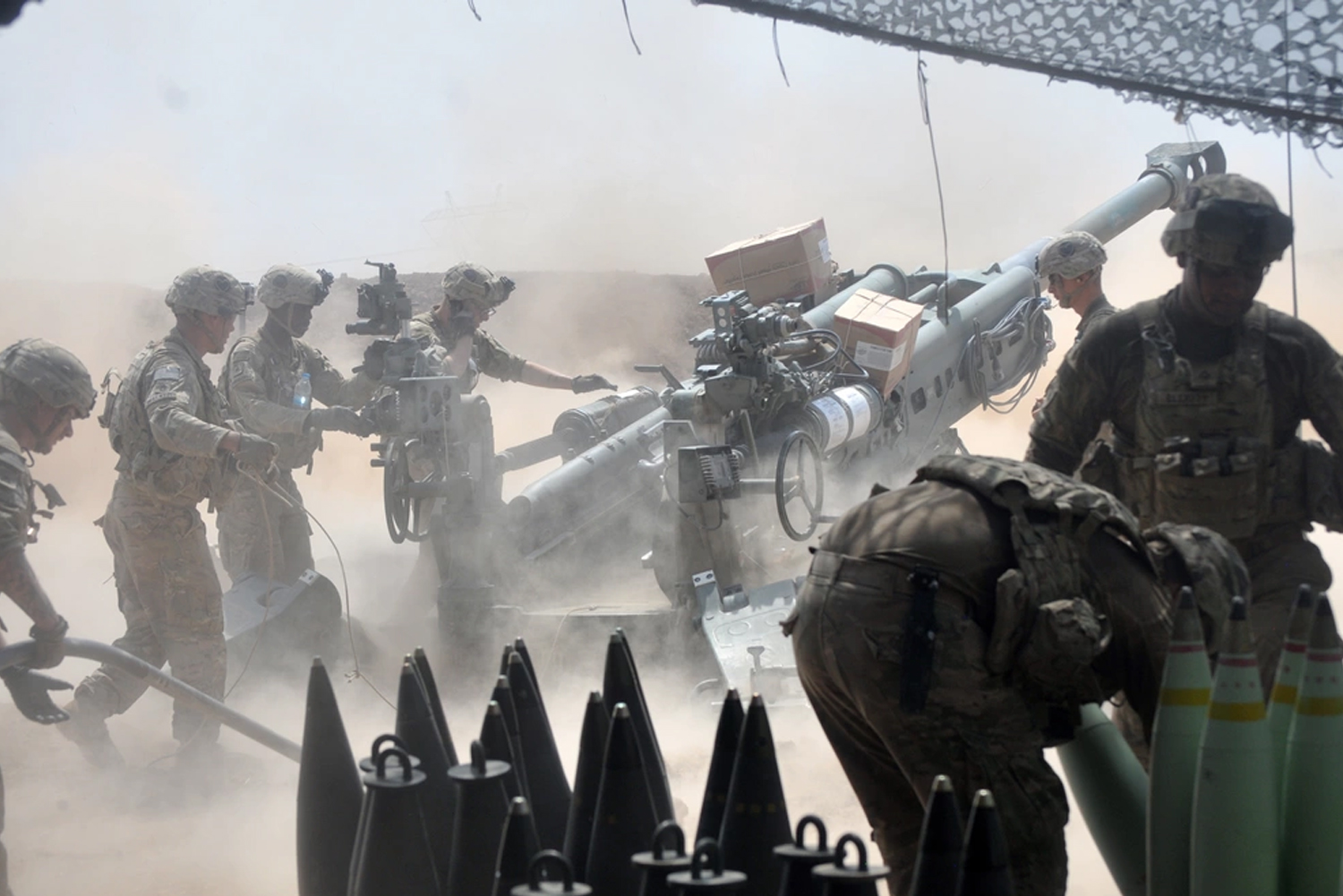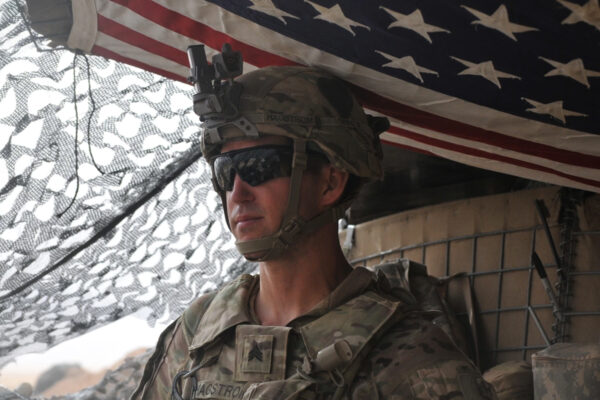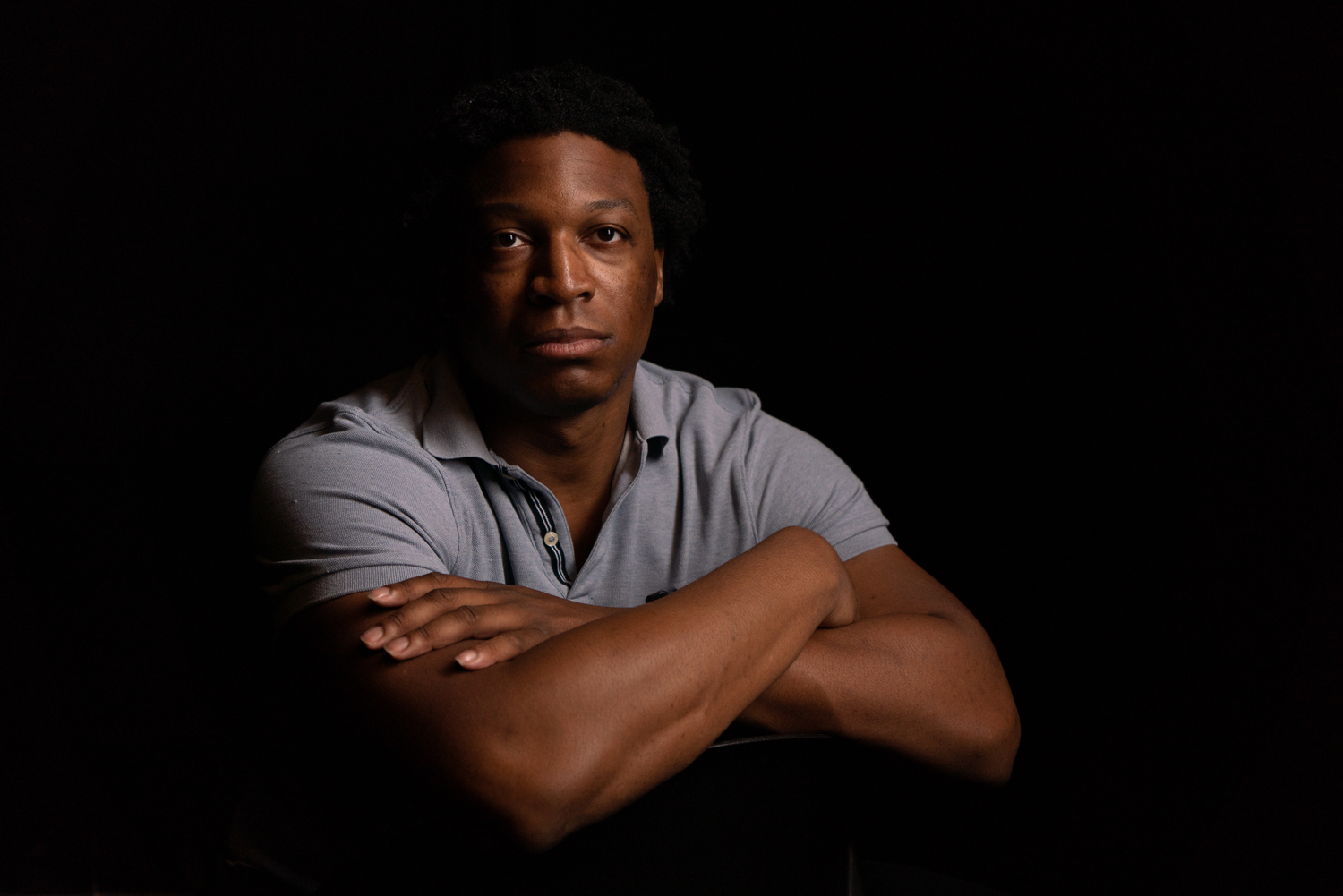A thunderous boom shook the ground, filling the air with dust and deafening a group of nine soldiers. Feet away from where they stood, their long-range cannon had just fired a 95-pound projectile miles through the air. It was one shot of over 1,000 that each of the men would see in the next nine months.
Daniel Johnson, a PhD student in the UNC Hussman School of Journalism and Media, was one of those men. In 2016, at the height of ISIS power, he served in the U.S. Army during a deployment in Iraq as his unit’s journalist.
“When I volunteered to be the journalist, I didn’t know what AP style was,” Johnson explains. “I didn’t know how to take photos or videos either.”
Now, he is in a PhD program at a top-ranked journalism school, his photos and videos have been used by the Associated Press and MSNBC, and his writing has inspired congressional legislation.
But his path to this point has been defined by loss and a struggle of his own.
Positive press
While Johnson was trained as an infantry officer, he quickly realized the importance of journalism during his time in the Army.
“I covered the activities of 1,500 people over dozens of locations,” he shares. “This allowed me to see things at a larger scale.”
In the trenches of Iraq, Johnson experienced the rise in atmospheric pressure upon the firing of heavy artillery. This is called blast overpressure. In a recent article for Slate, he described those shockwaves, which caused a dull pain in his head “like I had just gotten hit in the face.”
Blast overpressure can cause a traumatic brain injury, or TBI, much like those we associate with hard hits on the football field. Over time, TBIs can lead to long-term effects, one of the worst being Chronic Traumatic Encephalopathy (CTE), a degenerative brain disease.

In August 2016, Johnson captures this image of U.S Army Soldiers with Battery C, 1st Battalion, 320th Field Artillery Regiment, Task Force Strike as they begin the process to load another round in their M777 artillery piece in northern Iraq during an operation to support the Iraqi army. (photo by Daniel Johnson)
“A lot of the guys in my unit were 18, 19, and 20,” Johnson says. “They all suffered physically and mentally.”
But his job was to cover the positive moments within the drudgery of war for army families and the public — topics like U.S. progress and profiles on individuals — not possible TBIs.
Families loved the coverage. Packages and letters would arrive from the U.S. containing clips of Johnson’s articles, along with notes or phone calls expressing how nice it was to read about their sons and daughters risking their lives thousands of miles away.
His words and images had a real and tangible impact.
“The most rewarding part was when the families saw the articles,” Johnson says. “But things changed once we got home.”
Pushing policies
Upon getting back to the U.S in 2017, Johnson reflected on his and his peers’ struggles with mental health. Post-traumatic stress disorder (PTSD) was prevalent among the returning men and women. Suicide was not uncommon. Within six years of homecoming, seven of the soldiers that Johnson deployed with died by suicide. Two of them were from the artillery group.
Those are just the ones that he knew and is aware of.
Historically, the military has tied high rates of suicide to being comprised predominantly of young men — the demographic with the highest rate of suicide. Suicide among young men in the military is 80% higher than civilians in the same age group, though.
Johnson sought military support for his own mental health, but the phone numbers, websites, and resources provided to him were out of date. He used writing to bring awareness to this problem, again for Slate.
Now at Carolina, he structures his research to align with requirements for his classwork, uncovering data on military mental health.
“Because I was in the military, I know where to find the data,” Johnson says.
The Department of Defense (DoD) publishes data on military suicides, including ages and branches of the armed forces. They also issue mental health policies and official memos, but there is a disconnect between those and the data, which shows increasing suicide rates even as support systems are updated and resources are improved.
“The policies say one thing, but talking to a soldier, you may hear another,” he says.

Johnson had never picked up a camera before becoming a journalist for the military. Here, he captures Sgt. Nicholas Hagstrom, Apache Troop, 1st Squadron, 75th Cavalry Regiment, Task Force Strike as he stands guard at the Kara Soar Base in Iraq. (photo by Daniel Johnson)
Soldiers who seek mental health support often face a stigma of being weak, and those experiencing more common mental health symptoms, like anxiety and depression, are sometimes turned away. Johnson even faced pushback for seeking help. His job and responsibilities changed as a result.
He writes about what he discovers and publishes it in outlets that have a much broader reach than most class assignments, like Slate, The New York Times, and Task and Purpose, to name a few.
“I write to have a public and a policy impact,” he says.
His work is doing just that. Carolina has answered calls from the Pentagon, looking to talk to Johnson about his research and writing. Congress has changed legislation on the basis of his research and writing, too, using his work on broken and outdated suicide prevention links to make a change to the military’s support system.
Each department of the military must “review any information relating to suicide prevention” on their respective military websites, “make updates to such information as necessary,” and confirm with congress that it is up-to-date.
In the Slate article that detailed blast overpressure and TBIs, he used his courses as an opportunity to research the relationship between blast-related TBIs and mental health, including his own experiences to elucidate areas where the armed forces can make improvements and how policy could make the men and women in the military safer.
“This is why I turn my research into journalism articles: to be part of the public pressure to effect change,” Johnson says.
Trenches to teaching
Johnson finished his master’s at Carolina in 2022 and is now in his second year of the PhD program. During that time, he worked as a teaching assistant for Intro to Journalism and Advanced Journalism.
This coming fall, he will teach Intro to Journalism as the professor, while continuing to work on his dissertation about the use of technology and social media on the war in Ukraine.
Formally, Johnson never studied journalism. When he volunteered to be his unit’s journalist in 2016, he had a degree in criminal justice and no experience writing for news outlets.
“I learned in the moment,” he says. “I learned the power and importance of words and their effect on the world.”
He came to UNC-Chapel Hill to teach students about this power, using his failures and successes to prepare them better than he was to have so much influence in their hands — and the mess of ethics, research, data, and framing that comes with it.
“When I was in school, a lot of people helped me out,” Johnson says. “I came here because I wanted to do the same — to give back.”


